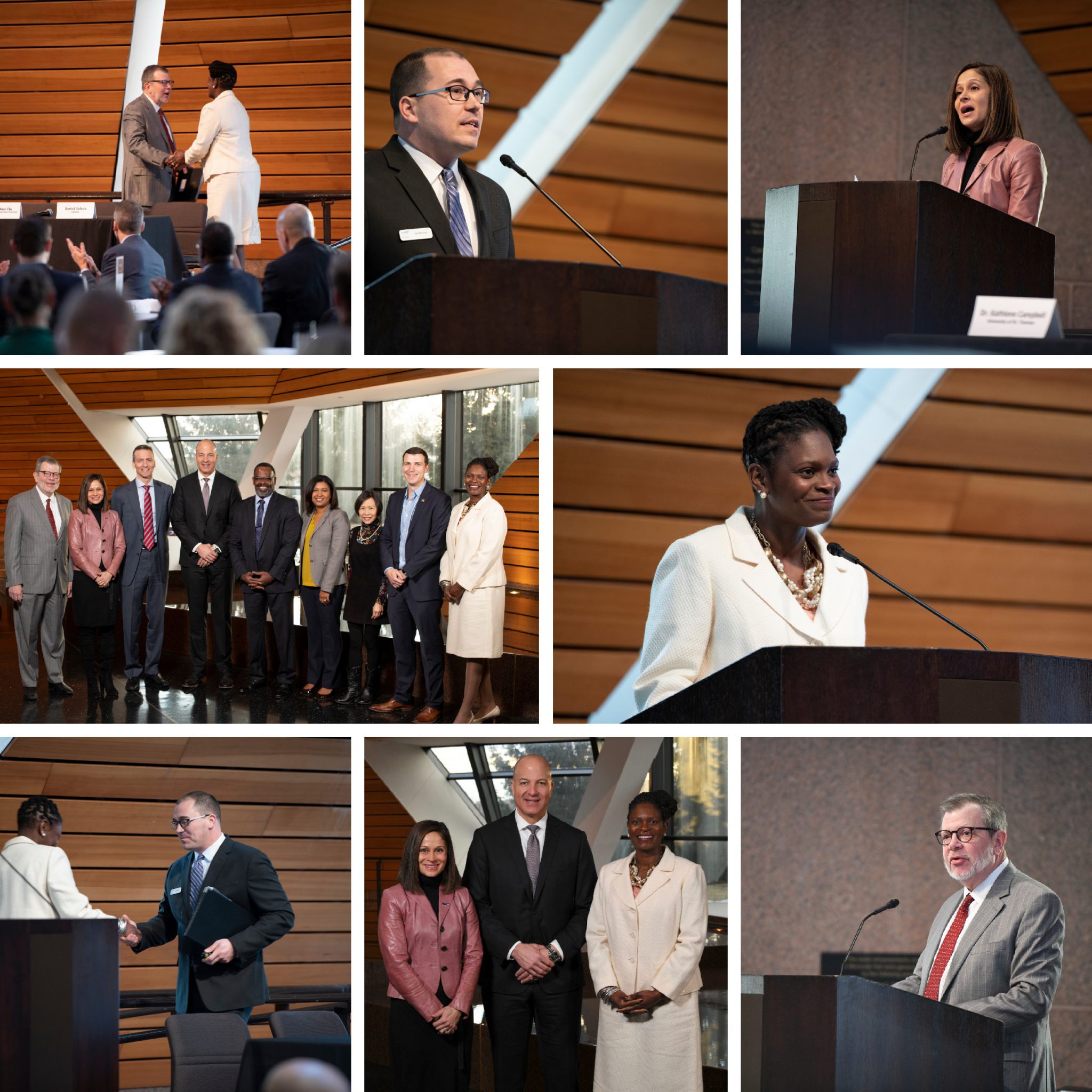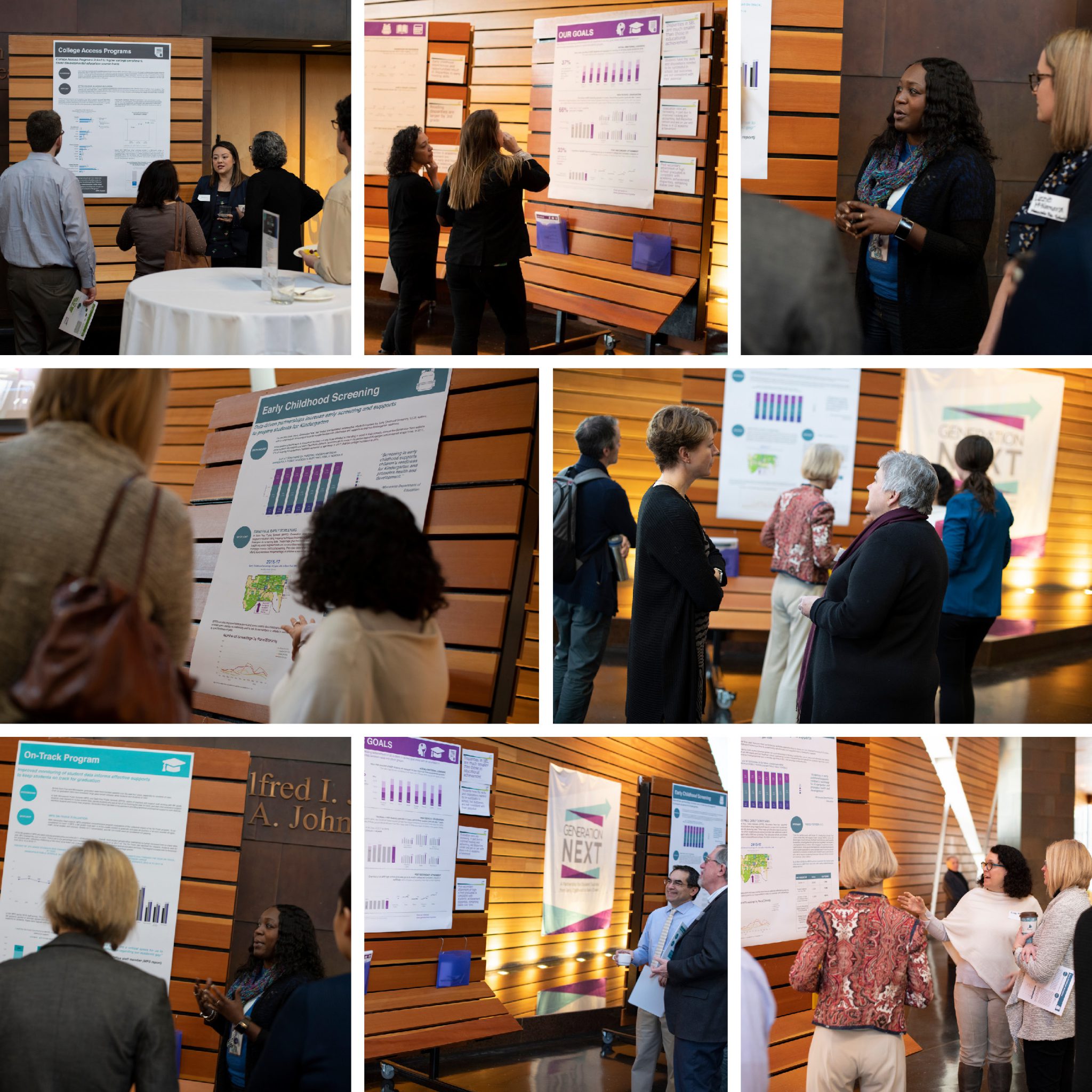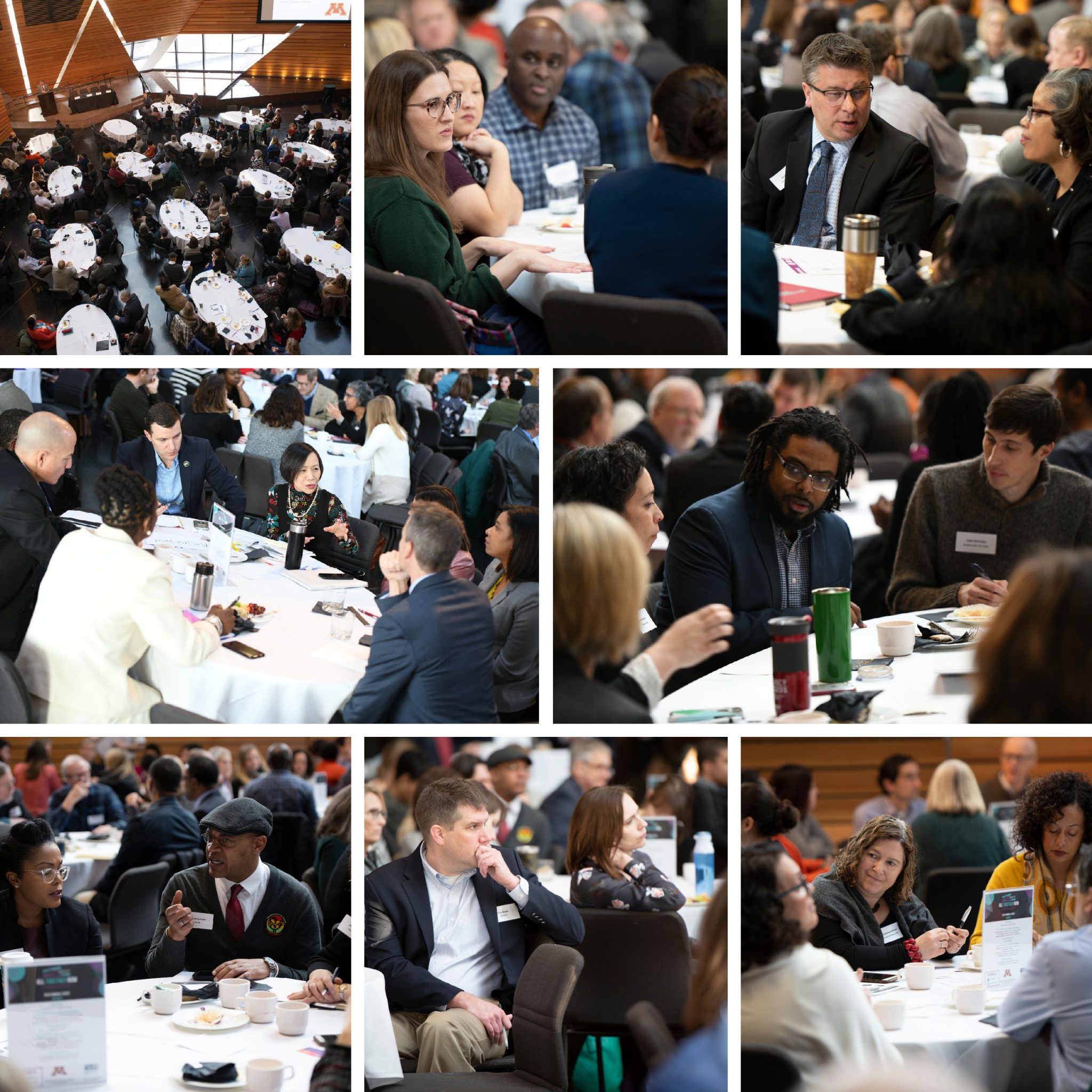2019 Annual Event Re-Cap

The Generation Next 2019 Annual Event: All Together Now…Innovating for Equity was held on January 10, 2019 at the McNamara Alumni Center at the University of Minnesota.
At this year’s event, over 180 attendees joined Generation Next as we shared our past success, new priorities for 2019, and discussed the topics of teacher diversity and educational transitions.
DATA WALK
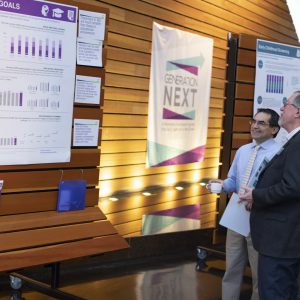
Before the event began, attendees participated in a data walk on outcomes related to our community level goals. Each data walk board display was hosted by network representatives who answered questions and shared key insights about the data.
SPEAKERS
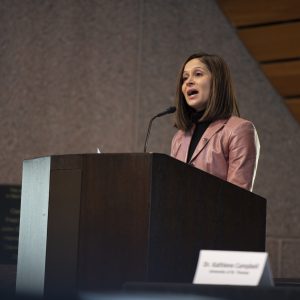 Reba Dominski, Generation Next Leadership Council Co-Chair, opened the event by speaking about her experience over the past six years. Reba said, “I want to start by taking you back to 2012 when local community, government, and business leaders met to discuss the unacceptable opportunity gaps in our Twin Cities community. Right in this very auditorium [McNamara Alumni Center], we publicly launched Generation Next. We set out a vision for an organization that would harness the community’s knowledge and expertise to create actionable steps to close opportunity gaps in the Twin Cities and to ensure that every child in our community can thrive.”
Reba Dominski, Generation Next Leadership Council Co-Chair, opened the event by speaking about her experience over the past six years. Reba said, “I want to start by taking you back to 2012 when local community, government, and business leaders met to discuss the unacceptable opportunity gaps in our Twin Cities community. Right in this very auditorium [McNamara Alumni Center], we publicly launched Generation Next. We set out a vision for an organization that would harness the community’s knowledge and expertise to create actionable steps to close opportunity gaps in the Twin Cities and to ensure that every child in our community can thrive.”
Reba then introduced Dr. Eric Kaler, outgoing president of the University of Minnesota and founding co-chair of the Generation Next Leadership Council. Dr. Kaler reflected on his involvement with Generation Next since its founding in 2012.
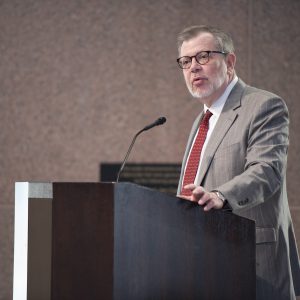 Dr. Kaler acknowledged the strong foundation that Generation Next has laid over the past six years: “We’ve spread the word, not only about the fundamental crisis of our community, but about Generation Next and our collaborative approach. We’ve increased awareness and created incredible momentum, mobilizing partners and leaders from civic, political, philanthropic and business sectors. We’ve brought together experts in literacy, social-emotional learning, teacher preparation, and culturally responsive pedagogy. We’ve made some real progress for our children.”
Dr. Kaler acknowledged the strong foundation that Generation Next has laid over the past six years: “We’ve spread the word, not only about the fundamental crisis of our community, but about Generation Next and our collaborative approach. We’ve increased awareness and created incredible momentum, mobilizing partners and leaders from civic, political, philanthropic and business sectors. We’ve brought together experts in literacy, social-emotional learning, teacher preparation, and culturally responsive pedagogy. We’ve made some real progress for our children.”
Dr. Kaler then introduced Michelle Walker, Executive Director of Generation Next. Michelle reflected on her time over the past two years as Executive Director, and the momentum that Generation Next has moving in to the future. She also spoke about Generation Next’s new priorities for 2019 and beyond.
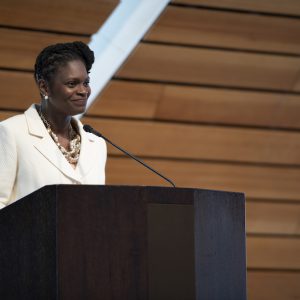
Michelle said, “The Generation Next Leadership Council set out four priorities that reflect an understanding of the systemic nature of our challenges. These are not the only areas that need attention, but they represent the areas where our collective attention is most needed and where we are uniquely positioned to make an impact on our cradle to career goals: Early Childhood Quality & Access, Post Secondary Preparation & Persistence, Teacher Diversity & Teaching Diverse Students, and Transitions.”
TABLE DISCUSSIONS: TRANSITIONS
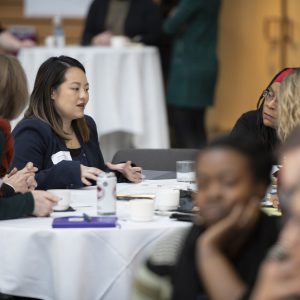
At each table, 2019 Annual Event attendees discussed the following questions: Where do you see systemic gaps in support for transitions? and What should the Generation Next Coalition do at a systems level to support transitions? The table discussions were facilitated by Generation Next Managing Director, Joe Munnich, and served as an opportunity for attendees to introduce themselves to one another and find common ground among their organizations regarding educational transitions. The Generation Next team collected over 50 notecards of feedback and suggestions from these discussions. We will be using these responses to help shape our future work around educational transitions in the Twin Cities community.
TEACHER DIVERSITY PANEL
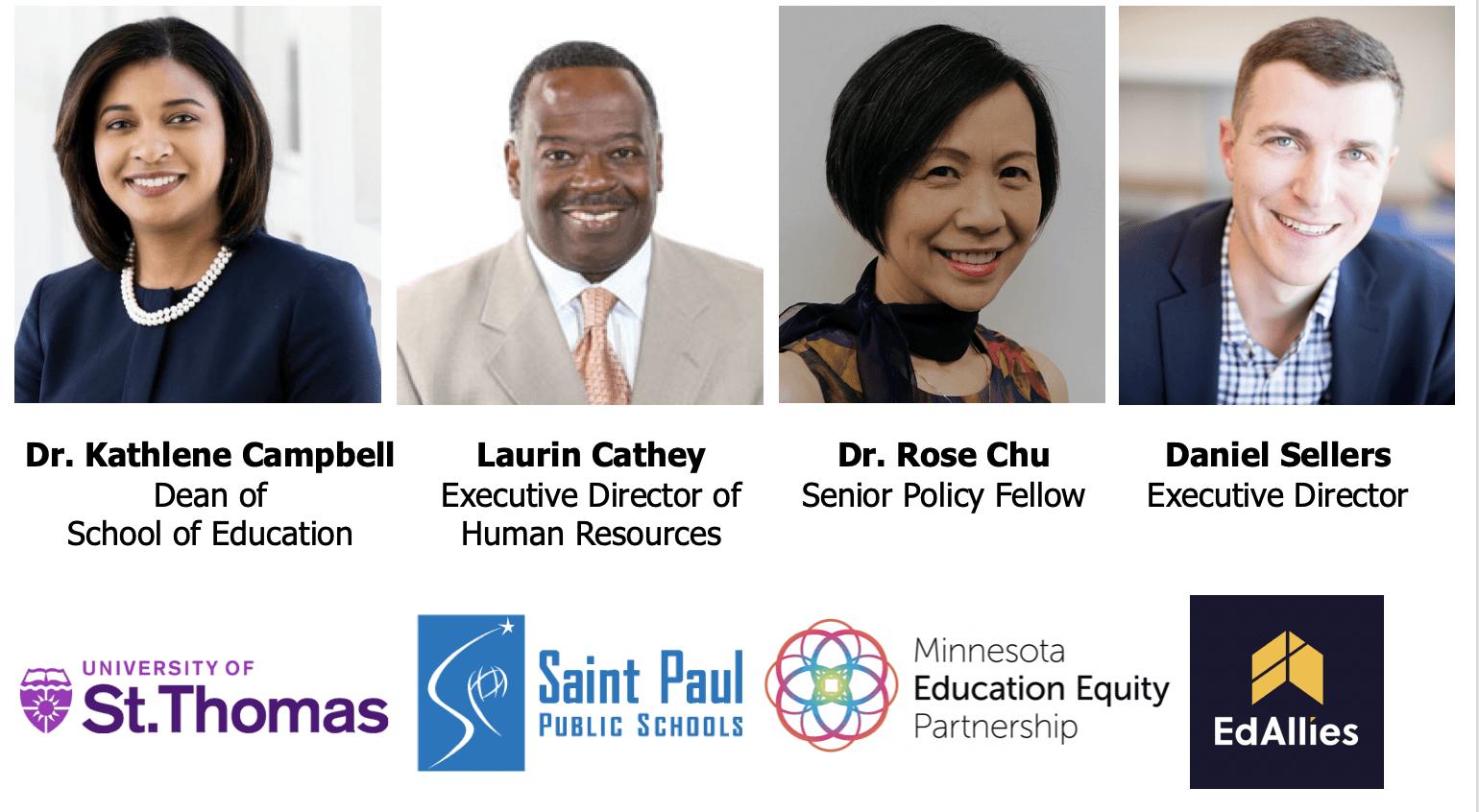
The 2019 Generation Next Annual Event closed with a panel focusing on Teacher Diversity and Teaching Diverse Students, featuring four Generation Next Coalition members working in various aspects of education in the Twin Cities. The panel included Dr. Kathlene Campbell, Dean of School of Education at St. Thomas; Laurin Cathey, Executive Director of Human Resources at Saint Paul Public Schools; Rose Chu, Senior Policy Fellow at the Minnesota Education Equity Partnership (MnEEP); and Daniel Sellers, Executive Director, EdAllies.
The panel was moderated by Jeremiah Ellis, Director of Outreach & Partnerships for Generation Next. Jeremiah asked the panelists questions that were specific to their work, as well as overall questions surrounding teacher diversity in the broader education community. The panel concluded with discussants sharing what they were committed to doing differently this year to advance efforts to increase cultural acumen of teachers, and how they would encourage the audience to create needed changes in 2019.
Reflecting on the panel discussion, Daniel Sellers said the following: “If we’re going to make progress towards our shared goal of increasing teacher diversity, we must start with the strategies laid out on the panel: respecting the voices and perspectives of teachers and aspiring teachers of color, appreciating innovative and alternative teacher preparation pathways, and reimagining the long-term career path of K-12 educators to include new leadership opportunities. It was so powerful to note, expressly, that improving the cultural competence of our teaching force should not require more of our teachers of color and indigenous teachers; instead, it is the responsibility of our white educators and school leaders to lead the profession towards more diversity, inclusivity, and culturally competency.”
Thank you to our meeting attendees, volunteers, speakers, panelists, data walk representatives, and the University of Minnesota for making our 2019 Annual Event such a great success! We look forward to sharing more about Generation Next’s new priority areas in 2019, and we look forward to next year’s event!

